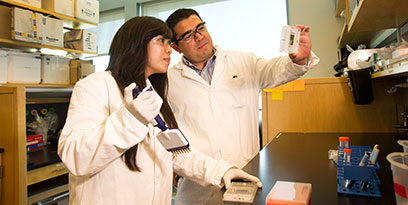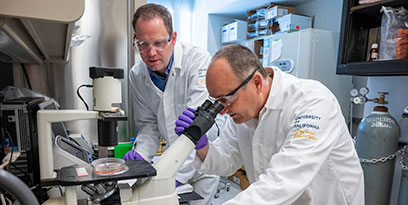Clifford G. Tepper, Ph.D.

Associate Research Biochemist
Research III, Room 2200A
4645 Second Avenue, Sacramento, CA 95817
Ph: 916-703-0365
e-mail
Research Interests
Androgen Independence Research: Dr. Tepper's laboratory is interested in identifying molecules that mediate survival of prostate cancer cells during androgen ablation therapy. We reasoned that adjuvant targeting of these molecules can delay or abolish the development of androgen independence by increasing apoptosis. To this end, we have utilized a combination of biochemical and microarray profiling to identify genes and pathways critical to androgen-independent survival. Data from the lab showed that the PI3K-Akt pathway is hyperactivated during androgen withdrawal (AW) and that pharmacological inhibition markedly induced apoptosis via combined FKHR transcription factor activation and diminished Bcl-2 expression.
Regulation of Androgen Receptor Expression Androgen ablation therapy of prostate cancer diminishes the androgen receptor (AR) pathway by antagonizing its function, thereby leading to a marked reduction in AR protein expression. However, hormone-refractory disease is generally characterized by AR pathway reinstatement distinguished by elevated levels of AR. One goal of Dr. Tepper's lab is to better understand this phenomenon by focusing upon mechanisms regulating AR expression, degradation, and stability. Data from the lab has shown that counter-regulatory polypeptide growth factor and androgen signaling influence steady-state AR levels by promoting degradation and stability, respectively. In the absence of androgen, AR levels decline rapidly via Akt phosphorylation and ubiquitin-mediated degradation. This is deregulated in androgen-independent sublines as they exhibited elevated AR levels in the presence of Akt hyperactivation.
Graduate Group Affiliations
Yang G, Jena PK, Hu Y, Sheng L, Chen SY, Slupsky CM, Davis R, Tepper CG, Wan YY. “The essential roles of FXR in diet and age influenced metabolic changes and liver disease development: a multi-omics study”. Biomark Res. 2023 Feb 18;11(1):20. doi: 10.1186/s40364-023-00458-9. PMID: 36803569; PMCID: PMC9938992.
Alexandrou AT, Duan Y, Xu S, Tepper C, Fan M, Tang J, Berg J, Basheer W, Valicenti T, Wilson PF, Coleman MA, Vaughan AT, Fu L, Grdina DJ, Murley J, Wang A, Woloschak G, Li JJ. “PERIOD 2 regulates low-dose radioprotection via PER2/pGSK3β/β-catenin/Per2 loop”. iScience. 2022 Nov 9;25(12):105546. doi: 10.1016/j.isci.2022.105546. PMID: 36465103; PMCID: PMC9708791.
Woo XY, Srivastava A, Mack PC, Graber JH, Sanderson BJ, Lloyd MW, Chen M, Domanskyi S, Gandour-Edwards R, Tsai RA, Keck J, Cheng M, Bundy M, Jocoy EL, Riess JW, Holland W, Grubb SC, Peterson JG, Stafford GA, Paisie C, Neuhauser SB, Karuturi RKM, George J, Simons AK, Chavaree M, Tepper CG, Goodwin N, Airhart SD, Lara PN, Openshaw TH, Liu ET, Gandara DR, Bult CJ. “A Genomically and Clinically Annotated Patient-Derived Xenograft Resource for Preclinical Research in Non-Small Cell Lung Cancer”. Cancer Res. 2022 Nov 15;82(22):4126-4138. doi: 10.1158/0008-5472.CAN-22-0948. PMID: 36069866; PMCID: PMC9664138.
Lee AQ, Konishi H, Duong C, Yoshida S, Davis RR, Van Dyke JE, Ijiri M, McLaughlin B, Kim K, Li Y, Beckett L, Nitin N, McPherson JD, Tepper CG, Satake N. “A distinct subpopulation of leukemia initiating cells in acute precursor B lymphoblastic leukemia: quiescent phenotype and unique transcriptomic profile”. Front Oncol. 2022 Sep 21;12:972323. doi: 10.3389/fonc.2022.972323. PMID: 36212452; PMCID: PMC9533407.
Campbell M, Chantarasrivong C, Yanagihashi Y, Inagaki T, Davis RR, Nakano K, Kumar A, Tepper CG, Izumiya Y. “KSHV Topologically Associating Domains in Latent and Reactivated Viral Chromatin”. J Virol. 2022 Jul 27;96(14):e0056522. doi: 10.1128/jvi.00565-22. Epub 2022 Jul 11. PMID: 35867573; PMCID: PMC9327698.
Vinall R, Chen Q, Talbott G, Ramsamooj R, Dang A, Tepper CG, Borowsky A. “Use of RNA-Seq and a Transgenic Mouse Model to Identify Genes Which May Contribute to Mutant p53-Driven Prostate Cancer Initiation”. Biology (Basel). 2022 Jan 29;11(2):218. doi: 10.3390/biology11020218. PMID: 35205085; PMCID: PMC8869245.
Liu C, Armstrong CM, Ning S, Yang JC, Lou W, Lombard AP, Zhao J, Wu CY, Yu A, Evans CP, Tepper CG, Li PK, Gao AC. “ARVib suppresses growth of advanced prostate cancer via inhibition of androgen receptor signaling”. Oncogene. 2021 Sep;40(35):5379-5392. doi: 10.1038/s41388-021-01914-2. Epub 2021 Jul 16. PMID: 34272475; PMCID: PMC8413131.
Fite BZ, Wang J, Kare AJ, Ilovitsh A, Chavez M, Ilovitsh T, Zhang N, Chen W, Robinson E, Zhang H, Kheirolomoom A, Silvestrini MT, Ingham ES, Mahakian LM, Tam SM, Davis RR, Tepper CG, Borowsky AD, Ferrara KW. “Immune modulation resulting from MR-guided high intensity focused ultrasound in a model of murine breast cancer”. Sci Rep. 2021 Jan 13;11(1):927. doi: 10.1038/s41598-020-80135-1. PMID: 33441763; PMCID: PMC7806949.
Tepper CG, Dang JHT, Stewart SL, Fang DM, Wong KA, Liu SY, Davis RR, Dao DY, Gregg JP, Török NJ, Chen MS Jr. “High frequency of the PNPLA3 rs738409 [G] single-nucleotide polymorphism in Hmong individuals as a potential basis for a predisposition to chronic liver disease”. Cancer. 2018 Apr 1;124 Suppl 7(Suppl 7):1583-1589. doi: 10.1002/cncr.31122. PMID: 29578593; PMCID: PMC5875707.
Campbell M, Watanabe T, Nakano K, Davis RR, Lyu Y, Tepper CG, Durbin-Johnson B, Fujimuro M, Izumiya Y. “KSHV episomes reveal dynamic chromatin loop formation with domain-specific gene regulation”. Nat Commun. 2018 Jan 4;9(1):49. doi: 10.1038/s41467-017-02089-9. PMID: 29302027; PMCID: PMC5754359.
Pan CX, Zhang H, Tepper CG, Lin TY, Davis RR, Keck J, Ghosh PM, Gill P, Airhart S, Bult C, Gandara DR, Liu E, de Vere White RW. “Development and Characterization of Bladder Cancer Patient-Derived Xenografts for Molecularly Guided Targeted Therapy”. PLoS One. 2015 Aug 13;10(8):e0134346. doi: 10.1371/journal.pone.0134346. PMID: 26270481; PMCID: PMC4535951.
Mudryj M, Tepper CG. “On the origins of the androgen receptor low molecular weight species”. Horm Cancer. 2013 Oct;4(5):259-69. doi: 10.1007/s12672-013-0152-z. Epub 2013 Jul 17. PMID: 23860689; PMCID: PMC4353596.
Vinall RL, Mahaffey CM, Davis RR, Luo Z, Gandour-Edwards R, Ghosh PM, Tepper CG, de Vere White RW. “Dual blockade of PKA and NF-κB inhibits H2 relaxin-mediated castrate-resistant growth of prostate cancer sublines and induces apoptosis”. Horm Cancer. 2011 Aug;2(4):224-38. doi: 10.1007/s12672-011-0076-4. PMID: 21789713; PMCID: PMC3249648.
Paprotka T, Delviks-Frankenberry KA, Cingöz O, Martinez A, Kung HJ, Tepper CG, Hu WS, Fivash MJ Jr, Coffin JM, Pathak VK. “Recombinant origin of the retrovirus XMRV”. Science. 2011 Jul 1;333(6038):97-101. doi: 10.1126/science.1205292. Epub 2011 May 31. PMID: 21628392; PMCID: PMC3278917.
Gautschi O, Tepper CG, Purnell PR, Izumiya Y, Evans CP, Green TP, Desprez PY, Lara PN, Gandara DR, Mack PC, Kung HJ. “Regulation of Id1 expression by SRC: implications for targeting of the bone morphogenetic protein pathway in cancer”. Cancer Res. 2008 Apr 1;68(7):2250-8. doi: 10.1158/0008-5472.CAN-07-6403. PMID: 18381431.
Tepper CG, Vinall RL, Wee CB, Xue L, Shi XB, Burich R, Mack PC, de Vere White RW. “GCP-mediated growth inhibition and apoptosis of prostate cancer cells via androgen receptor-dependent and -independent mechanisms”. Prostate. 2007 Apr 1;67(5):521-35. doi: 10.1002/pros.20548. PMID: 17252539.
Tepper CG, Gregg JP, Shi XB, Vinall RL, Baron CA, Ryan PE, Desprez PY, Kung HJ, deVere White RW. “Profiling of gene expression changes caused by p53 gain-of-function mutant alleles in prostate cancer cells”. Prostate. 2005 Dec 1;65(4):375-89. doi: 10.1002/pros.20308. PMID: 16037992.
Jessen KA, Liu SY, Tepper CG, Karrim J, McGoldrick ET, Rosner A, Munn RJ, Young LJ, Borowsky AD, Cardiff RD, Gregg JP. “Molecular analysis of metastasis in a polyomavirus middle T mouse model: the role of osteopontin”. Breast Cancer Res. 2004;6(3):R157-69. doi: 10.1186/bcr768. Epub 2004 Feb 25. PMID: 15084239; PMCID: PMC400667.
Tepper CG, Boucher DL, Ryan PE, Ma AH, Xia L, Lee LF, Pretlow TG, Kung HJ. “Characterization of a novel androgen receptor mutation in a relapsed CWR22 prostate cancer xenograft and cell line”. Cancer Res. 2002 Nov 15;62(22):6606-14. PMID: 12438256.
Tepper CG, Seldin MF. “Modulation of caspase-8 and FLICE-inhibitory protein expression as a potential mechanism of Epstein-Barr virus tumorigenesis in Burkitt's lymphoma”. Blood. 1999 Sep 1;94(5):1727-37. PMID: 10477698.
Chinnaiyan AM, Tepper CG, Seldin MF, O'Rourke K, Kischkel FC, Hellbardt S, Krammer PH, Peter ME, Dixit VM. “FADD/MORT1 is a common mediator of CD95 (Fas/APO-1) and tumor necrosis factor receptor-induced apoptosis”. J Biol Chem. 1996 Mar 1;271(9):4961-5. doi: 10.1074/jbc.271.9.4961. PMID: 8617770.
Tepper CG, Jayadev S, Liu B, Bielawska A, Wolff R, Yonehara S, Hannun YA, Seldin MF. “Role for ceramide as an endogenous mediator of Fas-induced cytotoxicity”. Proc Natl Acad Sci U S A. 1995 Aug 29;92(18):8443-7. doi: 10.1073/pnas.92.18.8443. PMID: 7545303; PMCID: PMC41173.
Tepper CG, Studzinski GP. “Resistance of mitochondrial DNA to degradation characterizes the apoptotic but not the necrotic mode of human leukemia cell death”. J Cell Biochem. 1993 Jul;52(3):352-61. doi: 10.1002/jcb.240520311. PMID: 8366146.
Tepper CG, Studzinski GP. “Teniposide induces nuclear but not mitochondrial DNA degradation”. Cancer Res. 1992 Jun 15;52(12):3384-90. PMID: 1596897.
Tepper CG, Pater MM, Pater A, Xu HM, Studzinski GP. “Mitochondrial nucleic acids as internal standards for blot hybridization analyses”. Anal Biochem. 1992 May 15;203(1):127-33. doi: 10.1016/0003-2697(92)90052-9. PMID: 1524208.
Upper Division Courses
- 192 Internship in Biological Chemistry
- 198 Group Study
- 199 Special Study for Advanced Undergraduates
Graduate Courses
- 298 Group Study
- 299 Research
Professional Courses for Medical Students
- 498 Group Study
- 499 Research




